Advanced Rocketry Group Ltd. Trident 172-18
Advanced Rocketry Group - Trident 172-18 {Kit}
Contributed by Chan Stevens
| Construction Rating: | starstarstarstar_borderstar_border |
| Flight Rating: | starstarstarstarstar |
| Overall Rating: | starstarstarstarstar_border |
| Manufacturer: | Advanced Rocketry Group |
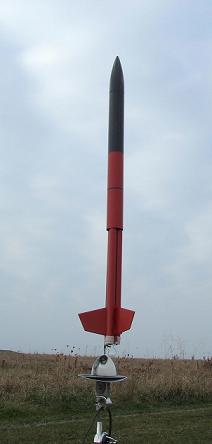
Brief:
Advanced Rocketry Group's Trident series are 3-motor clusters with rugged components, designed strong to handle the
power. This review is of the 18mm version, one of the smaller of the line that spans the 13 to 29mm cluster range.
Construction:
This is the first ARG kit I've opened and built, and I was quite impressed with the quality of the components. The
balsa nose cone was a little rough, but not bad at all. The body tubes were excellent, and even the fins and bulkhead
were plywood. The parts list includes:
- Balsa nose cone
- 1.72" dia payload and body tubes
- BT-20 13.5" motor tubes (3)
- Coupler tubes (2)
- Plywood fins, bulkhead
- 15" Nylon chute
- Kevlar®/elastic shock cord
The instructions for this were decent, consisting of 3 full 8.5x11 sheets of text and a separate sheet with a profile drawing of the rocket, fin pattern and rear view. Compared to the typical kit in terms of illustrations, this is a bit below average, but as long as you read the instructions, there shouldn't be much difficulty. It is a fairly easy kit to build, probably about a skill level 2.
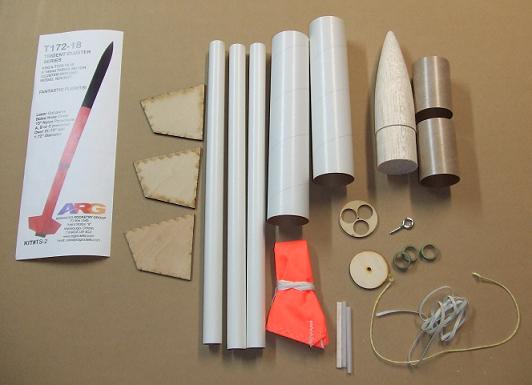
The construction is broken out into phases, and at the start of each phase is a list of parts that will be needed for that phase, a nice touch.
The first phase is the motor mount. Not your typical motor mount here... I started off by inserting a centering ring motor block into each of the 3 BT-20 tubes, then gluing the tubes together into a triangle/pyramid. The simplest way to do this and keep everything lined up, is to glue two tubes together on a flat surface. This is covered in the instructions. After those have dried, rotate and glue the third tube into the seam.
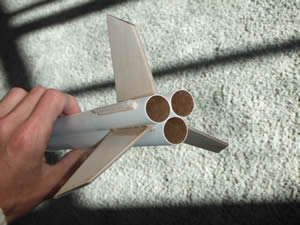
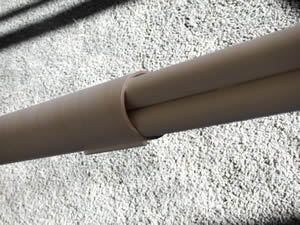
The shock cord is anchored by what I found to be an interesting method--tie a couple of knots about an inch apart in the end of the Kevlar®, then lay a thick bead of glue into the forward 3" of one of the body tube joints and set the Kevlar® into that. The forward end of the Kevlar® threads through a hole in the bulkhead disk (barely). The bulkhead is completed by sliding a coupler down the BT-20 assembly covering the top 3", attaching the bulkhead disk, then sliding the upper airframe tube over the coupler. Everything fit together nice and snug.
There's a payload section that consists of the basic body tube, coupler, solid bulkhead disk (in this case
recessed a little bit into the coupler), a nose cone and a screw eye shock cord attachment point.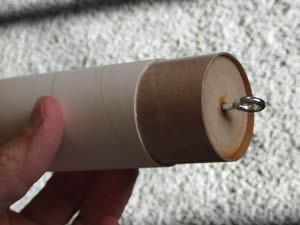
The third phase is fin assembly, which is really a snap. No tube marking, as the triad of motor tubes takes care of setting 3 visual lines to work with. All that's needed is some sanding of the leading and trailing edges and a generous bead of glue to fit them into the tube seams and "bite". There are a pair of launch lugs, one on the upper section and one on one of the motor tubes which requires a small balsa standoff.
Installing the very nice nylon chute is all that remains of construction.
Finishing:
I liked the red and black color scheme on the cover art, so tried to replicate it. I started off with two coats of
black primer, the first of which was sanded almost completely off, serving as spiral filler, which I'd skipped thus
far. I then followed up with 3 coats of Krylon (old formula) cherry red, masked off for the black stripes and upper
section, and shot everything with 2 coats of gloss black. I was very pleased with the finished look, but think this
could really use a basic decal or two. At the very least, something identifying this as an ARG kit would help promote
awareness.
Construction Rating: 3 out of 5
Flight:
I arrived at the field pleasantly surprised by light winds, so I decided to go for broke for the first flight. I
grabbed a pack of C6-5's and loaded 'em up. Given the length of the tubes leading to the upper chamber, I went a bit
light on the dog barf.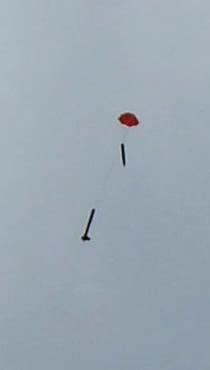
All 3 motors lit right away, and the TR172-18 shot up, straight as an arrow. It ascended just out of eyesight before I spotted the delay smoke trail. The -5's were a bit early, meaning the recommended -7's would be a better choice, but it was slow enough to avoid any damage.
Recovery:
The 15" chute brought it down just fine, and didn't even have a trace of burn damage.
Flight Rating: 5 out of 5
Summary:
This was my first ARG build, and I was very impressed. It's a very good design, flies great, and the cluster
certainly bears a bit of a wow factor. The instructions could incorporate a few illustrations, and I'd like to see some
decals with it, but this is otherwise a very nice kit.
Overall Rating: 4 out of 5
 |
 |
Flights
Sponsored Ads
 |
 |








